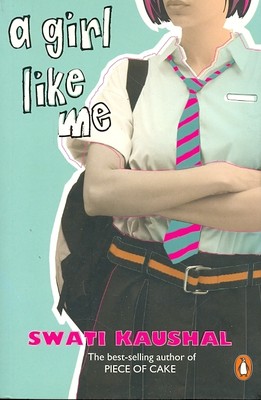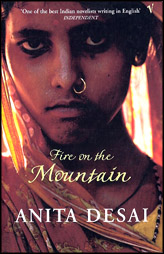A Girl Like Me
Find out more about: A Girl Like Me here Recently transplanted from the quiet, green suburbs of Minnesota to the bustling concrete jungle that is Gurgaon, sixteen-year-old Anisha Rai is determined not to take to the new place she must call home. While her irrepressible mom, Isha, thrives on the crazy juggling between a hotshot job and their new home, Annie— desperately clutching on to memories of her father whom she lost three years ago— plods through each day with as little enthusiasm as she can. But it's not going to work, is it? Not when she's discovered that her goofy childhood friend Keds has transformed into quite a dude and still remembers their first kiss; that she's been severely infected by her quirky classmates' zest for everything fun despite utmost resistance; that the H-O-T-T college-going theatre enthusiast Kunal wants to teach her a lot more than drama . . . And when her deceptively unassuming neighbours reveal hidden agendas, Annie's life suddenly becomes hotter to handle than she could ever have imagined. Deftly weaving through home and school and the secret places in Annie's world, A Girl Like Me is an unforgettable story, crackling at every turn with the heartbreak and promise— and the breathless exuberance— of teenage life. 'Read the opening chapter of A Girl Like Me below' New Delhi. it has changed since i saw it last, it has thickened, blackened, erupted like a pollinating pod. The straight, sparse lines that used to make up the contours in the distance are gone. They are shattered into fragments, twisted into flyovers, contorted into high-rises, billboards, pounding masses of people. The buildings are taller and leaner, the slums have gained weight, the colours are vivid whirls and splatters, grimier and shinier all at once. It comes at me with a new snarl and an old odour, this old new city, it pelts me with its heat, it lashes across my face; it makes me dizzy. I close my eyes against the burning yellows and blinding reds outside my taxi window, settle back against the burning vinyl seat. My mind pulls up the soothing greys and whites of the winter backyard. It used to be bald, the winter backyard. A birch, a pine, a few skinny ashes; a single Dutch Elm that spread its filigreed wings over the peeling deck, the sunlight shards of silver pierced through its bony branches. When the breeze blew you saw stars dance. And on the ground, the endless snow. It covered everything; it looked soft and fluffy as a comforter filled with down, like you could lie right down and pull it over yourself and disappear underneath its soft white folds and dream soft white dreams. And all around the shrunken skeletons of bushes that promised to keep a quiet vigil; the icicles hanging from their arms that promised to keep the soft white cold pinned down around you. It had been quiet, the backyard in winter. So quiet that if you looked straight up you could hear the sounds of the universe. The explosions on Jupiter and the storms on Saturn and the thin slivers of mythical ice that you imagined froze ever harder on Mars. You could hear the crash of meteors and the flares on the sun and the birthing pains of planets in galaxies far, far away. Time was a tease on the backyard in winter. At night, if you were alone, it would run amok. You'd be staring out at the quiet nothingness and suddenly, like a drunken diva, it would step right out of its clothes and go skinny-dipping in the cold night air. It would fling out its arms and turn cartwheels on the snow, it would dance backwards and forwards and round and round and take you spinning along with it. And then, just as suddenly, it would spit you out and leave you cold. Oh, the backyard had been cold. So cold. A sweet chill descended from the North Pole every winter and froze in ice every ache, every lingering pain. Frosty-faced, fur-hooded, shovelling and salting your driveway you didn't notice for a while— not till the mountains of snow ran runny, not till the new squirrels and goslings and chipmunks took over the yard, the loons the lake— that some essential part of you was missing. That spring paw prints could spring tears in your eyes. I open my eyes against the smart of fresh ones. Before me is the frayed collar of the taxi driver. It is crumpled, sagging, ringed with sweat. Above it a brown neck rises dark and lined, like the solid trunk of a sturdy tree. Like Dad's used to be. He'd been tone deaf and loud-voiced and prone to singing, my dad. His was the first voice I heard when I woke up every morning. Good morning, Ani-bunny . . . Annie, Dad! My name's Annie! Funny Ani, how you kill me, aha, sunny Ani! He'd sing it to the Abba song, butchering both lyrics and melody. I'd launch my pillow at him. He'd laugh. His eyebrows— so thick I could have braided them— would dance. His cheeks, freshly shaved and still stubbly, would stretch wide; his enormous elastic nose even wider . . . Ani, honey! He used to swing me around on his wide back even when I wasn't so small any more. Rock-a-bye-Ani . . . Daddy! Stop! On the treetop . . . Daa-ddy!!! We stopped missing him last Halloween, Ma and I. It had been a whole year. Ma dressed up as an Oompa Loompa in a leafy body suit with a sack of cacao beans and went to her office party and promised to come back drunk. I gelled my hair green and attached a ring to my brow and went trick-or-treating with Jessica and Jaime. It was a hoot. Jessica drove with the top down on the Mustang, her witch hat awry. Midway through, it started to snow. It fell in our hair and our faces and our eyes and we stopped at the edge of the lake to catch our breath and watched the chill rise in smoky wisps from our lips. We made breath rings in the frosty night and Jaime played with her orange hair and described the many ways in which Brad Anderson was a jerk. There were millions. And then Jessica spotted a deer. It was at the far side of the lake, slatted between the trees. Its neck froze the instant it saw us. For a moment its eyes flashed bright in its face, like embers in gold. We stared at it and held our breath. And then it ran away. Oh, it was a good, hard winter last year; the kind where the mercury drops to twenty-two below and the hairs in your nostrils stick together and everyone walks around with a furry Nordic halo and it's okay if you never smile. There had been such comfort in that bitter cold. Everything had been, for a short while, bearable. And then in April the snow melted and the layers came off. I missed him. I missed his hands. There was a pair of hands at the grocery store— dark, broad, square, with dried raisins for knuckles— the new Pakistani gentleman at the counter ringing up our purchases. There were dark whiskers of hair on the backs of his fingers, wiry and tough and bristling; those hands came home with me stuck like splinters in my skin. I looked in the mirror and saw thick brows, Dad's brows, wide, knotted, ropy. I went at them with Ma's tweezers till they were shreds of shoelace ringed in smarting flesh, above stinging eyes. They'd been so dark, his eyes. Black and shiny, patent leather. They looked at you with a fierce love, you saw yourself shine in them. Even through the glasses; when he had his glasses. I'd found them in the freezer once, stuck to the frozen enchiladas. He loved those soggy enchiladas. He'd left them too long in the microwave one summer and a wormlike squiggle of sauce had squirted on to his forearm right above the thin strip of pale skin that lived under his watchstrap, which he wore too tight. His 'live strong' bracelet, I used to tease. He'd spent that last year thinning. His chin thinning, his cheeks hollowing, his smile wrinkling, his laugh coughing, his cough racking, the growing lines in his face deepening, they used to move, he used to move. He used to move. And now, we're moving. 'Isn't this exciting, Ann?' I open my eyes. Ma is sitting in the small square of shade cast in the car by the eleven-o'clock sun, her sunglasses dark over her eyes, her hair cool in a knot high on her head. If I were to bring her wrist close to my face, the bracing bouquet of orange-ginger body spray would invigorate me, no doubt. 'All this bustle,' she says, waving a fragrant hand at the chaos outside, 'this sense of purpose, this smell of opportunity?' I tell her it is very exciting. 'Can you believe this flyover? And those shops? Oh, look Ann, another condo!' I look at the latest high-rise outside my window. It shines like a beacon between squalid rows of tin-box establishments. It is dark-glassed and metallic, like a Hollywood star. Garden Villa, the engraved metal plate in the brick says. 'Amazing, isn't it, how fast everything's growing? Like a teenager!' I look out at the great sweltering city. After two thousand years of existence it has, according to Ma, found a growth spurt. 'You know, Ann, you'll fit right in. There are all kinds of facilities these days. And sports is exploding, you have no idea how. Tennis, swimming, that new golf course everyone's talking about!' I remind her that golf is the one sport I'm not into. 'Yes, but you could be! Oh, it's going to be just lovely. This time next week we could even be in our new home. Imagine!' I try very hard not to.
Top rated books in this category































